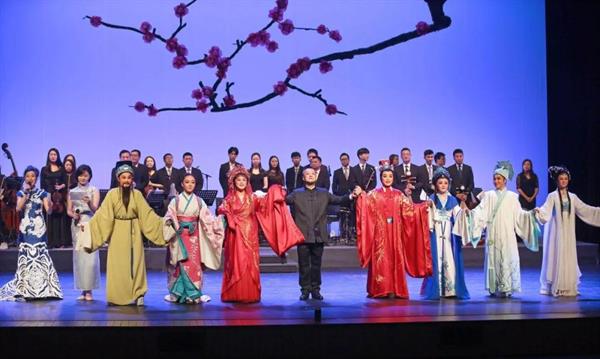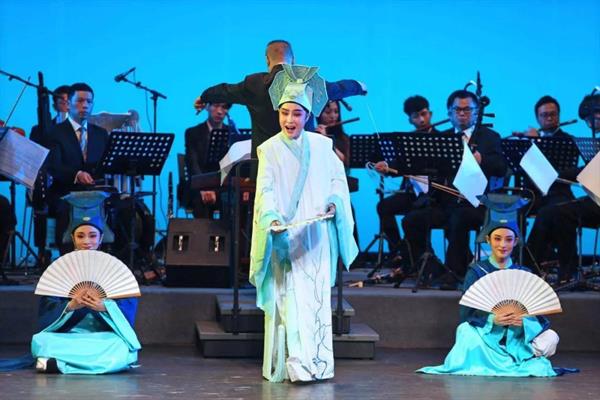
ZJCM Welcomes 29 Composers from 16 CEEC Countries
2022-06-17The welcome ceremony for 29 composers from 16 Central and Eastern European countries was held in Zhejiang Conservatory of Music (ZJCM) on 07 June. 2018 Central and Eastern European Countries Composers' Field Trip in China is sponsored by the Department for External Cultural Relations of the Ministry of Culture and Tourism, and organized by ZJCM.
Following the speeches by Mr Cai Xiaochun, Vice Director of Zhejiang Department of Culture, and Prof. Yang Jiuhua, Vice President of ZJCM, all the composers and guests enjoyed a Yue opera concert performed by top-class artists of Zhejiang Xiaobaihua Yue Opera Troupe.
Composers joined in a seminar with the faculty of ZJCM's Department of Composing and Conducting on 08 June, during which four young scholars of the Department presented their music pieces one after another. Then the composers observed the rehearsal of ZJCM Traditional Chinese Orchestra in the afternoon.
Composers' trip continued in Sichuan, Inner Mongolia, and Beijing after their stay in Zhejiang.




Further reading: News Report from China Daily
Central and Eastern Europe composers find inspiration in China
By Li Wenrui | chinadaily.com.cn | Updated: 2018-06-22 13:00
In June, 29 composers from 16 Central and Eastern European countries traveled to experience Chinese musical culture, from the Yangtze River Delta Region to the Inner Mongolia autonomous region.
The three-week field trip, sponsored by the Department for External Cultural Relations of the Ministry of Culture and Tourism, is designed to give visiting composers a taste of different musical styles in Southeast and Northwest China.
"The past three weeks were really a life-changing experience, [which] will leave a strong imprint on our future creativity," Macedonian composer Jana Andreevska said during a press conference in Beijing on June 20. "I admire what the country is doing to keep the musical heritage alive."
UNESCO intangible cultural heritages, such as the Mongolian long song and Khoomei, left a deep impression on musicians' minds.
"It's not only that we are discovering China and its different cultures and traditions, but we are also discovering each other. And this is something wonderful," Estonian composer Helena Tulve said.
"I'm very impressed by the vastness of Chinese cities, the integration between music and people's lives, and most of all, China's investment in both modern and traditional music education," said Serbian composer Aleksandra Vrebalov, also a participant in the 2016 field trip. "The Zhejiang Conservatory of Music in Hangzhou is the most impressive education complex for music I have ever seen."
"Cultural interactions create possibilities for cooperation and communication," Liu Shun, professor of the China Conservatory of Music, said. "Professional exchange, for example in the musical field, will facilitate people-to-people friendship among nations."
This year's field trip is the second round of the Central and Eastern European Countries Composers' Field Trip in China initially proposed by China's Ministry of Culture and Tourism in 2015 and held in 2016.
The program serves part of the Suzhou Guidelines for Cooperation between China and Central and Eastern European Countries, and the Sofia Declaration on Cultural Cooperation between China and Central and Eastern European Countries (2016-2017).
To share Chinese music with a global audience, visiting composers are commissioned to compose music suitable for Chinese instruments in the year after their visit. Their resulting works will be premiered during the 2019 China-CEEC Cultural Season.
(Source: China Daily; Link: http://europe.chinadaily.com.cn/a/201806/22/WS5b3083cea3103349141de980_2.html )


